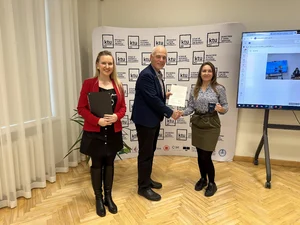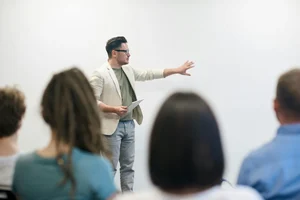Eglė Butkevičiūtė, an early-career researcher from KTU Faculty of Informatics has advanced to the InSPiR2eS Global Pitching Research Competition. With 6 other finalists from across the world, she will compete for the main prize, 5 thousand Australian dollars.
Pitching research ideas is an essential skill for securing funding, gaining collaboration, or generating interest in research. It is hard to believe, but even ideas such as the CRISPR “genetic scissors” were initially met with scepticism by funding agencies and the wider scientific community. However, by simplifying the idea and making it understandable to both laypeople and the scientific community, CRISPR not only received funding and global recognition but its inventors were awarded the 2020 Nobel Prize in Chemistry.
“In today’s scientific world, the ability to present research effectively in a short time is crucial for scientists across all disciplines. Whether you work in biomedicine, engineering, social sciences, or other areas, the ability to present your ideas is a skill that is valuable both in academia and in business,” says Neringa Gerulaitienė, a researcher at KTU’s School of Economics and Business.
Dr Gerulaitienė initiated the University’s participation in the InSPiR2eS Global Pitching Research Competition 2024 (IGPRC2024). Its goal is to provide a platform for young researchers to present their scientific work clearly and effectively, reaching both the academic community and the wider public.
Research focuses on personal health monitoring
Last autumn, for the first time in Lithuania, the IGPRC2024 took place at KTU. During the event, three early career KTU researchers were allowed to participate in the Competition’s semifinals. The event at KTU was organised in collaboration with Professor Robert Faff, the founder and president of the global research network InSPiR2eS.
“It’s been a pleasure to see how this competition is empowering young researchers to communicate their work effectively. Their enthusiasm and professionalism highlight the university’s commitment to excellence in research and education. This event is setting a new standard for fostering academic growth here in Lithuania,” said Prof. Faff, while visiting KTU in autumn.
Dr Eglė Butkevičiūtė, one of the three semi-finalists from KTU, was selected to further to the finals and to compete for the main prize of 5,000 Australian dollars.
Dr Butkevičiūtė’s idea focuses on improving the accuracy of real-time stress and fatigue detection from PPG signals by applying advanced noise reduction techniques. Her study aims to make personal health monitoring more accessible and impactful, especially for young students balancing work and studies.



